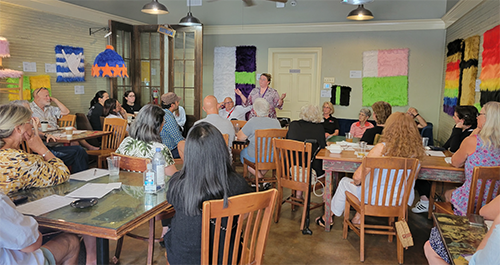More than 6 million people in the United States are living with Alzheimer's disease, a form of dementia that typically begins with memory concerns and later develops into severe cognitive problems. As the disease progresses, affected individuals may need
intensive care and support, which can place significant burdens on families and communities. At the June SCI Café in Galveston, members of the local community joined Alzheimer's experts from the University of Texas Medical Branch (UTMB) and
the Alzheimer's Association to better understand the disease and learn how to support affected individuals and their caregivers.
SCI Cafés
are monthly events hosted by UTMB’s Institute for Translational Sciences. Members of the public are invited to learn about a pressing medical concern and ask questions of leading experts on the topic. In the June event, more than 30 members
of the community gathered in an independent coffee shop decorated with colorful local art to learn about the biology of Alzheimer’s disease, resources for patients and families, and the latest research advances that may one day help stop
its devastating effects.
Alzheimer’s disease is thought to be caused by the abnormal build-up of molecules in and around brain cells. UTMB neurology professor Dr. Giulio Taglialatela explained how the brains of people with Alzheimer’s have clumps or “plaques”
of a protein called amyloid in between brain cells and tangles of a protein called Tau inside cells. These plaques and tangles damage brain cells and stop neurons from sending electrical signals to one another. Over time, the disruptions become more
severe, leading to severe cognitive problems.
Alice Williams, a social worker and community initiatives manager in the Sealy Center on Aging at UTMB, went over how critical
it is for people with dementia and their caregivers to seek out support. "This can be a 5 to 20-year journey," said Williams.
Along that journey, patients and families can turn to the Alzheimer's Association, said Stephanie Fitzgerald, Bay Area Regional Manager for the Houston and Southeast Texas Chapter of the Alzheimer's Association. In
addition to fundraising, patient advocacy, and more, the Alzheimer's Association offers a 24/7 helpline that patients or caregivers can call for information and advice.
All three presenters agreed that we can all reduce our risk of developing Alzheimer’s by controlling risk factors. This includes getting good sleep, eating a healthy diet such as the Mediterranean diet, and keeping your brain active with games, puzzles, and lifelong learning. Current treatments such as a drug approved by the U.S. Food and Drug Administration in January 2023 are limited and can only slow the disease, not cure it.
Researchers continue to look for better options, including ways to prevent the disease. Dr. Taglialatela, who is director of UTMB’s Mitchell Center for Neurodegenerative Diseases and UTMB’s new Brain Health Institute, gave the audience a reason for hope. Those plaques and tangles that are found in the brains of Alzheimer's patients can also
be found in healthy patients. "The presence of tangles and plaques in cognitively normal patients gives us hope that there is a way to resist their effects," said Dr. Taglialatela. The goal now is to identify the protective factors that make some
brains resilient to dementia.
The Institute for Translational Sciences and the SCI Café series are supported by a Clinical and Translational Science Award from the National Center for Advancing Translational Sciences at the National Institutes of Health.

--------------------------------
The Alzheimer’s Association's 24/7 helpline is: (800) 272-3900